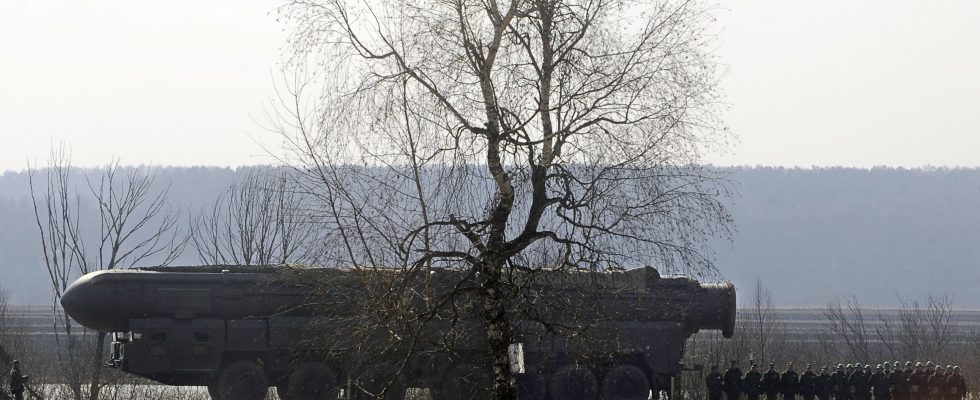Men, more men, to make up for the losses. Vladimir Putin is preparing a new mobilization to swell the ranks of the Russian army, on the sidelines of the war in Ukraine. On the front, kyiv no longer hides its desire for a counter-offensive, as the fighting got bogged down this winter. What can it lead to? According to recent US intelligence leaks, the possible territorial gains are very small. Russia dug many trenches to defend its positions in the east. Paradoxically, Ukraine is doing the same, especially around Bakhmout, the epicenter of the war, which has become a symbol to be destroyed.
Russia tests intercontinental missile
Again, nuclear rhetoric. This Tuesday, Russia carried out an intercontinental ballistic missile test, capable of carrying nuclear warheads, a new step in diplomacy by the atomic bomb of Vladimir Putin. On March 25, the Russian leader announced that Moscow would deploy “tactical” nuclear weapons in Belarus, its ally in the conflict, sparking concern in Kiev and the West.
A “combat” unit successfully launched an intercontinental ballistic missile (ICBM)” from the Kapustin Yar test site, the Russian Defense Ministry said in a statement. “The missile’s training warhead hit a fictional target at the Sary Shagan (Republic of Kazakhstan) training ground,” the statement added, without specifying the type of weapon used.
Vladimir Putin had promised at the end of February the entry into service this year of the latest intercontinental ballistic missile, the Sarmat, described as a weapon capable of “thwarting all anti-aircraft systems” and which “will make those who try to threaten” Russia. The country also withdrew from the New Start nuclear disarmament treaty, signed in 2010. The agreement limited the nuclear stockpile of the United States and Russia, which could engage in mutual inspections.
Russia facilitates enlistment in the army
A mail, and to war. Russian MPs voted on Tuesday a law allowing mobilization orders to be sent electronically, a measure that will make it more difficult to escape the army and complicate the lives of those who have fled abroad. Concretely, according to the Russian media, the mobilization orders will be sent via the Gosouslougy system used by millions of Russians for a whole series of administrative procedures.
Once the order has been sent, the mobilized person is prohibited from leaving the country. In the absence of a Gosouslougy account, the electronic order will still be considered valid after seven days, again according to the media. Until then, mobilization orders had to be delivered by hand to the mobilized, which allowed many Russians to ignore these summonses or to have time to move, or even to flee the country, as dozens have done. of thousands of men during the wave of mobilization in September to fight in Ukraine. 300,000 men had been mobilized, sometimes chaotically.
Near Bakhmout, Ukraine is also digging its trenches
Trenches against trenches. While Russia seems to be gaining ground in Bakhmout, the epicenter of the war, Ukraine is preparing for the possibility of a withdrawal, and is digging trenches around it to avoid losing too much ground. After about nine months of battle, two-thirds of this eastern Ukrainian city is in Russian hands. However, if the city were to fall, kyiv fears that the major cities of Donbass still under its control, Sloviansk and Kramatorsk, will be threatened. On its side of the front, Russia is making the same calculation. In the east as in the south, kilometers and kilometers of trenches were dug at a good distance from the line of contact.
US intelligence leak: Washington tries to reassure
How did these pieces end up online? After around 50 “top secret” American intelligence documents ended up online, the heads of American diplomacy and defense exchanged with their Ukrainian counterparts on Tuesday. Objective: to reassure. Defense Secretary Lloyd Austin notably assured his counterpart Oleksiï Reznikov that he took this leak of classified documents “very seriously”.
Reason for this passage of ointment? Some intelligence notices do not pass. According to press reports and documents seen by AFP on Tuesday, US intelligence has expressed doubts about a potential Ukrainian counter-offensive that could only achieve “modest territorial gains” against Russian forces. A Ukrainian counter-offensive against Russian troops is expected in the spring. Ukraine claims to have, upstream, formed assault brigades and stored ammunition while striving to spare its troops and exhaust those of its adversary on the front.
